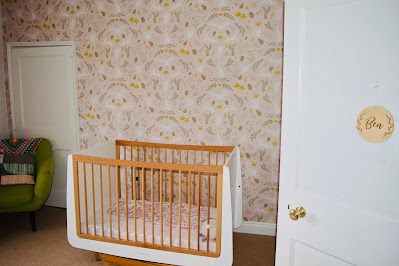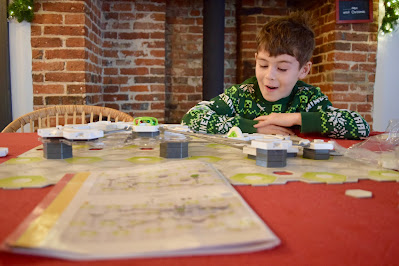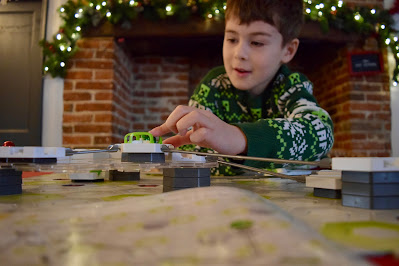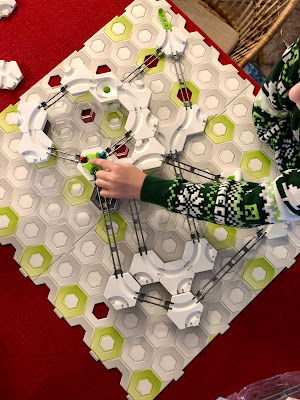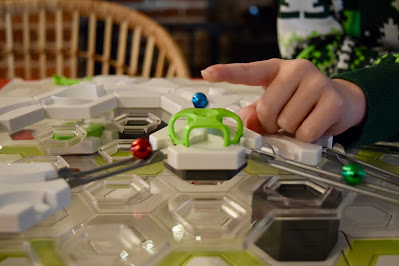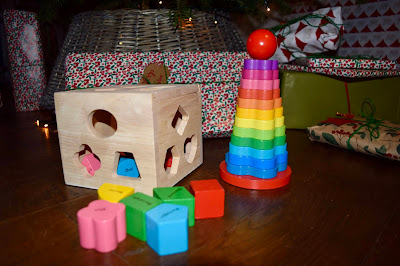Tuesday, 28 December 2021
House // A Sneak Peak into Bea's Room
Monday, 27 December 2021
Review // GraviTrax Starter Set
Monday, 13 December 2021
Review // Baby's 1st Christmas ideas with Jaques of London
Wednesday, 8 December 2021
Should I Consider a Holiday Camp for My Child?
Holiday camps are a great way of letting your child develop individual skills that will enhance their development as they grow. It’s an exciting opportunity for children to take part in that will bring lasting memories and a world of adventure to a child.
You may be wondering, should you look into holiday camps for your child?
Well, this guide from a childcare centre in London should help you sway your decision.
Developing your child’s skills
If your child is keen on adventure, looking for things to do that will excite them, then a holiday camp is a no brainer. There are different versions of holiday camps across the country, but children are usually taken on an experience or trip for a day and returned by the end of the working day.
Depending on where a child’s taken, a lot of unique skills and interests can be developed as a result, such as critical thinking and decision making skills. If you want your child to develop in new ways, maybe consider a holiday camp.
Is your child comfortable around others?
Something to consider is how they’ll handle being alone for long periods of time. Maybe your child is really invested in day trips out, or they prefer keeping to themselves and avoiding conversation.
There’s no right or wrong way of nurturing your child’s social skills, but you should be prepared for what may happen. Your child may also come out of their shell, if they’re shyer, thanks to going on a holiday camp during the summer.
Take them on a test run to see how they do
If all else fails, you can look to pick your child up after a few hours of being with other children if they’re feeling overwhelmed.
They can learn to slowly build their confidence and social skills through going to holiday camps and it can make them feel involved with the other kids.
*sponsored post
Tuesday, 7 December 2021
Understanding Your Child's Curriculum
A child’s curriculum will be essential to their understanding of complex subjects and to allow them to progress nicely through their school career. For parents, however, it’s key to learn about your child’s studies and what they’ll be doing throughout their time at school. It’ll also help you find ways you can help your child with their homework and future revision for exams.
In this guide from a prep school in Middlesex, we take a look at the ways you can build your understanding of your child’s curriculum to help them through school.
A basic understanding of the UK curriculum
What’s helpful is learning how the UK curriculum is laid out for students. Firstly, the curriculum is laid out in key stages, from key stage 1 right through to key stage 5, which will dictate what your child learns as they develop.
In their earlier stages, key stages 1 - 3, there’s a stronger emphasis on understanding numeracy, literacy and science-based skills.
They’re learning how to develop transferable skills that can be used in future studies. When they reach key stage 3, they’ll be taking on more specific subjects like History and English Language to develop their skills further, as well as exploring what subjects your child likes.
Key stage 4 is when children will begin studying for their GCSE exams, and key stage 5 is when they enter A-Level studies.
These two periods will allow children to focus their efforts on the subjects they want to study, alongside compulsory subjects.
How to understand a child’s curriculum
The best place to learn more is by visiting the school’s website. There will be clear direction as to what’s studied throughout their years at the school and also details on if you’d like to talk to teachers about the curriculum in more detail.
Parents evenings are also a great time to further understand a child’s studies and what they’ve been getting on within class, as well as continually following your child’s work at home and being involved in their progress.
*sponsored post
Thursday, 2 December 2021
How to Raise a Respectful Child
Respect is a core value and skill that children should be able to follow and understand as they grow and become more aware of the world around them.
Not only are respectful children more trustworthy and understanding, but you can strengthen the bond between you and your child. This guide from a private school in Kent will show you how you can raise a respectful child and build an established relationship.
Explain what respect is in layman’s terms
Half the battle is showing your child what respect actually is without using too many complicated words. Use easy terms that your child knows the meaning of and guide them through practical examples.
The main themes of respect are admiring others, knowing when to honour someone’s opinion, being kind towards everyone you come into contact with and clearly listening to others.
Identify times when your child is being disrespectful
There are times when your child will be rude and unkind, whether it’s purposeful or not. This is when you should step in and tell your child how they should be behaving, and question why they were rude to someone else.
Anger at a young age is harder to curb than when you’re an adult, so try to not get visibly angry at your child’s behaviour. Instead, look for ways to show them that that’s not how they should act in front of others.
Praise them for being respectful
If you’re seeing signs that your child’s doing well in a situation, give them praise for what they’ve done. They’re more likely to remember those moments when they’re older and work towards doing good when they’re with friends, family and even those they don’t know.
Any time you see your child do something good you should aim to give praise, even if it doesn’t amount to much. It’s good to see your child feel motivated to do well and make a good effort where they feel they can add value.
*sponsored post
Wednesday, 1 December 2021
Exploring Moral Values with Your Child
Moral values are key beliefs that all of us as human beings should follow and instil throughout their lives. They define what’s right and wrong and separate the good and bad, which children should be made aware of as they grow up.
As parents we should be guiding our children through these core values that will shape and define your child into educated and mindful adults.
In this guide we take a look at how you can explore moral values with your child at this private school in London.
- Be their role model
A lot of times, children will be following their parents and seeing what they do to better themselves. Even in the slightest of actions children will be keen to follow their parents in what they do or what they suggest.
This is where you should be acting positive actions in front of your child and let them follow your guide. If they see how you treat others, offer respect and express gratitude in front of others, they’re more likely to follow your lead.
- Practice through role playing
You can quiz your child gently by having them look at different situations and see what they’ll do when you pose them questions. Ask them what they would do if they saw a friend in distress, or if they saw a child dropped their favourite toy and didn’t notice.
Depending on how old your child is, you’ll be able to instil positive values in your child from an early age.
- Play problem solving games
Board games are a great way of getting kids to solve problems and understand that they won’t always win! Show them that while making mistakes or “losing” doesn’t mean that they can’t handle problems in the future.
The more problem solving games your child plays, the better they can handle whatever’s thrown at them.
*sponsored post
-
Leading pork pie manufacturers, Pork Farms are one step closer to finding their Board Games Champion with the announcement of their semi-f...
-
Ru has taken to potty training like a pro! He's had hardly any accidents and is no longer using nappies during the day. I sta...
-
Over the weekend I noticed Ru had a really nasty cough. Which was worse in the evening and morning. I decided to call the doctors first...

